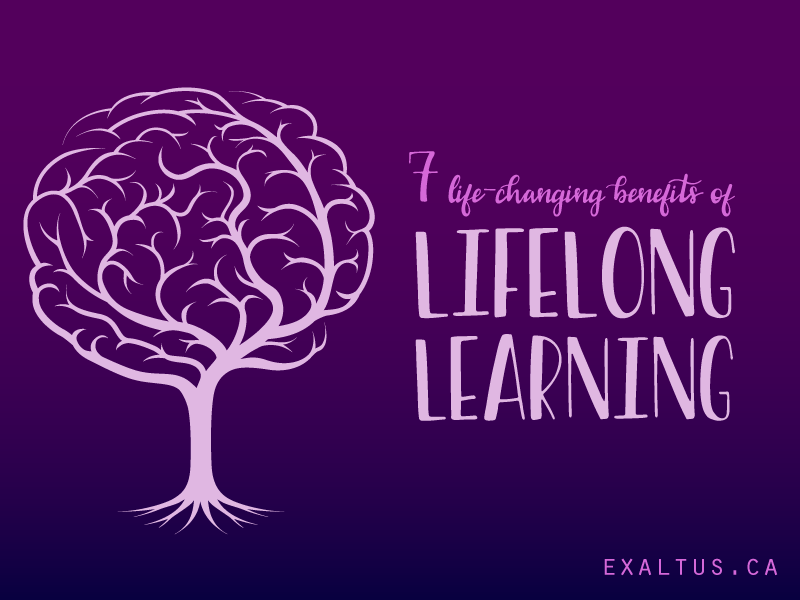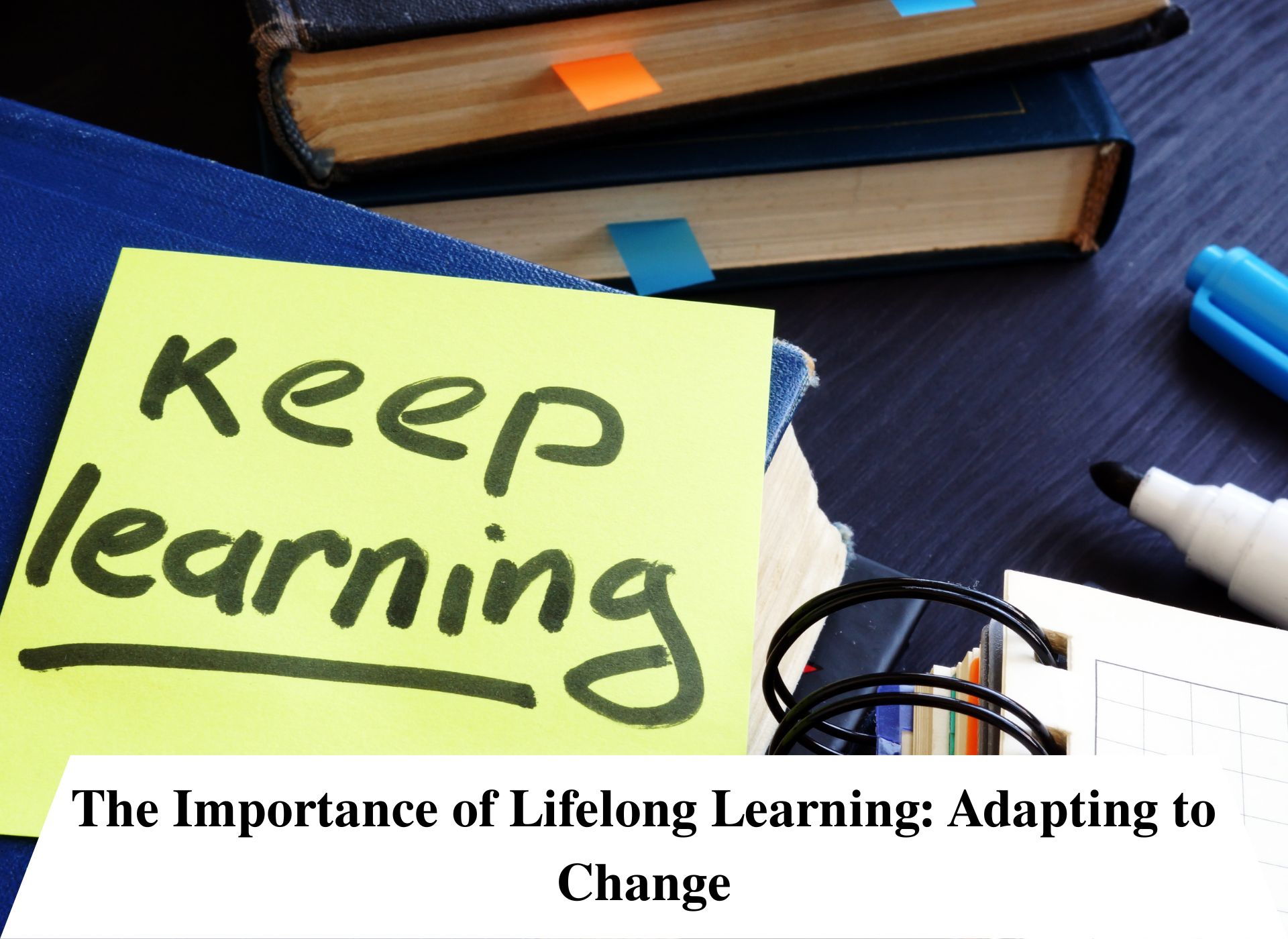The Impact of Lifelong Learning: Staying Relevant in a Changing World
 In an era characterized by rapid technological advancements, global interconnectedness, and shifting economic landscapes, the concept of lifelong learning has emerged as a crucial strategy for personal and professional development. Lifelong learning, defined as the continuous, voluntary, and self-motivated pursuit of knowledge for personal or professional reasons, goes beyond traditional educational pathways. It embodies the idea that learning does not end with formal education but is a continuous process that enhances one's adaptability, innovation, and relevance in an ever-changing world.
In an era characterized by rapid technological advancements, global interconnectedness, and shifting economic landscapes, the concept of lifelong learning has emerged as a crucial strategy for personal and professional development. Lifelong learning, defined as the continuous, voluntary, and self-motivated pursuit of knowledge for personal or professional reasons, goes beyond traditional educational pathways. It embodies the idea that learning does not end with formal education but is a continuous process that enhances one's adaptability, innovation, and relevance in an ever-changing world.
The Necessity of Lifelong Learning in the Modern Age
The world today is vastly different from what it was a few decades ago. Technological innovation has accelerated at an unprecedented pace, leading to the rise of artificial intelligence, machine learning, and automation. These developments have disrupted industries, rendered certain job roles obsolete, and created new ones that require a completely different set of skills. For instance, according to the World Economic Forum, over one-third of the skills considered important in today's workforce will have changed in just five years. This dynamic environment underscores the necessity for individuals to continually update their skills and knowledge. Lifelong learning helps individuals stay abreast of new developments, understand emerging trends, and acquire new competencies. It ensures that one's skills remain relevant, thereby enhancing employability and career prospects. More importantly, lifelong learning fosters a culture of curiosity and resilience, empowering individuals to navigate and thrive in an ever-evolving landscape.
This dynamic environment underscores the necessity for individuals to continually update their skills and knowledge. Lifelong learning helps individuals stay abreast of new developments, understand emerging trends, and acquire new competencies. It ensures that one's skills remain relevant, thereby enhancing employability and career prospects. More importantly, lifelong learning fosters a culture of curiosity and resilience, empowering individuals to navigate and thrive in an ever-evolving landscape.
The Personal Benefits of Lifelong Learning
Cognitive Health and Mental Agility: Engaging in continuous learning has been shown to have significant benefits for cognitive health. Studies suggest that lifelong learning can help maintain mental agility and delay the onset of cognitive decline. The process of acquiring new skills and knowledge stimulates brain function, improves memory, and enhances problem-solving abilities.
Self-Confidence and Personal Satisfaction: Lifelong learning boosts self-confidence and personal satisfaction. The accomplishment of mastering new skills or understanding complex subjects instills a sense of achievement. This not only enhances self-esteem but also motivates further learning. The personal growth that results from lifelong learning contributes to a more fulfilling and enriched life.
Adaptability and Resilience: In a rapidly changing world, adaptability is key. Lifelong learning equips individuals with the tools to adapt to new situations, whether they are personal or professional. It fosters resilience, enabling individuals to cope with change and overcome challenges. This adaptability is particularly valuable in the face of economic uncertainties and shifting job markets.
The Professional Advantages of Lifelong Learning
 Enhanced Employability: Employers highly value employees who demonstrate a commitment to continuous learning. Lifelong learners are perceived as proactive, motivated, and capable of taking initiative. They are more likely to be considered for promotions and are often seen as assets to their organizations. Furthermore, the ability to learn and adapt quickly is a critical skill in many industries, making lifelong learners more attractive candidates in the job market.
Enhanced Employability: Employers highly value employees who demonstrate a commitment to continuous learning. Lifelong learners are perceived as proactive, motivated, and capable of taking initiative. They are more likely to be considered for promotions and are often seen as assets to their organizations. Furthermore, the ability to learn and adapt quickly is a critical skill in many industries, making lifelong learners more attractive candidates in the job market.
Career Advancement: Continuous learning opens up opportunities for career advancement. By acquiring new skills and knowledge, individuals can qualify for higher-level positions or transition into different career paths. For example, a marketing professional who learns about data analytics and digital marketing can expand their career prospects significantly.
Innovation and Creativity: Lifelong learning fosters innovation and creativity. Exposure to new ideas and different ways of thinking can spark creative solutions and innovative approaches to problems. This is particularly important in industries that rely on innovation to stay competitive. Employees who continuously learn are better equipped to contribute to their organization's growth and success.
The Societal Impact of Lifelong Learning
A workforce that is committed to lifelong learning contributes to economic growth and development. Skilled workers drive productivity and innovation, which are essential for a thriving economy. Countries that invest in education and promote lifelong learning tend to have more resilient and competitive economies.
Lifelong learning promotes social cohesion and inclusion. It provides opportunities for individuals from diverse backgrounds to improve their skills and knowledge, thereby reducing inequality. Lifelong learning initiatives can help marginalized groups gain access to education and employment opportunities, fostering a more inclusive society.
Educated individuals are more likely to engage in civic activities and contribute positively to their communities. Lifelong learning encourages informed and active participation in societal issues, leading to stronger, more vibrant communities. It also fosters critical thinking and informed decision-making, which are essential for a functioning democracy.
Challenges and Solutions in Promoting Lifelong Learning
Despite its numerous benefits, promoting lifelong learning comes with challenges. These include: Access and Affordability: Not everyone has access to lifelong learning opportunities. Financial constraints, geographical limitations, and lack of infrastructure can hinder access to education and training programs. To address this, governments and organizations need to invest in affordable and accessible learning solutions. Online education platforms, community learning centers, and employer-sponsored training programs can help bridge the gap.
Access and Affordability: Not everyone has access to lifelong learning opportunities. Financial constraints, geographical limitations, and lack of infrastructure can hinder access to education and training programs. To address this, governments and organizations need to invest in affordable and accessible learning solutions. Online education platforms, community learning centers, and employer-sponsored training programs can help bridge the gap.
Motivation and Engagement: Maintaining motivation for continuous learning can be challenging, especially for individuals juggling multiple responsibilities. Creating a supportive learning environment is crucial. Employers can play a significant role by fostering a culture that values learning and development. Additionally, offering incentives such as career advancement opportunities, recognition, and rewards can motivate individuals to pursue lifelong learning.
Relevance and Quality of Learning: Ensuring that learning opportunities are relevant and of high quality is essential. Education providers must continually update their curricula to reflect current industry standards and emerging trends. Collaboration between industry and educational institutions can help align learning programs with market needs. Moreover, emphasizing practical, hands-on learning experiences can enhance the effectiveness of lifelong learning initiatives.
The Role of Technology in Lifelong Learning
Technology has revolutionized the landscape of lifelong learning. Digital tools and online platforms have made education more accessible and flexible, allowing individuals to learn at their own pace and on their own terms. Some ways in which technology is enhancing lifelong learning include:
- Massive Open Online Courses (MOOCs) and other online courses offer a wide range of subjects and skills that individuals can learn from anywhere in the world. Platforms like Coursera, edX, and Khan Academy provide high-quality education from reputable institutions, often at little to no cost.
- E-learning platforms and mobile learning apps have made it easier for individuals to access educational content on the go. This flexibility is particularly beneficial for working professionals and those with busy schedules. Mobile apps such as Duolingo for language learning and LinkedIn Learning for professional development are popular examples.
- Virtual and augmented reality technologies offer immersive learning experiences that can enhance understanding and retention. For instance, medical students can use VR to simulate surgeries, and engineering students can use AR to visualize complex structures. These technologies make learning more engaging and effective.
- Artificial intelligence (AI) is transforming education by enabling personalized learning experiences. AI-powered platforms can assess individual learning styles, track progress, and provide customized learning paths. This tailored approach ensures that learners receive the support they need to succeed.
The Future of Lifelong Learning
As we look to the future, the importance of lifelong learning will only continue to grow. The pace of change in technology and the global economy will demand that individuals constantly update their skills and knowledge. The future of lifelong learning will be characterized by:
Microlearning and Modular Learning: The trend towards microlearning and modular learning will become more prominent. Short, focused learning modules that can be easily integrated into daily routines will appeal to busy professionals. These bite-sized learning experiences are more manageable and can be tailored to specific needs.
Collaborative and Social Learning: Collaborative and social learning will gain traction as individuals seek to learn from and with others. Online communities, peer-to-peer learning, and collaborative projects will enhance the learning experience. Social learning platforms that facilitate interaction and knowledge sharing will play a significant role.
Lifelong Learning Ecosystems: The development of lifelong learning ecosystems that integrate various learning opportunities will be crucial. These ecosystems will include formal education institutions, online platforms, community organizations, and employers. Collaboration among these stakeholders will ensure a seamless and comprehensive learning journey.
Recognition of Informal Learning: As lifelong learning encompasses both formal and informal learning, there will be a greater emphasis on recognizing and accrediting informal learning experiences. Digital badges, micro-credentials, and portfolios will provide a means to validate and showcase skills acquired outside traditional educational settings.
Conclusion
 In conclusion, the impact of lifelong learning on staying relevant in a changing world cannot be overstated. It is a powerful tool that empowers individuals to adapt, innovate, and thrive amidst the uncertainties of the modern age. The personal, professional, and societal benefits of lifelong learning are immense, contributing to cognitive health, career advancement, economic growth, and social cohesion.
In conclusion, the impact of lifelong learning on staying relevant in a changing world cannot be overstated. It is a powerful tool that empowers individuals to adapt, innovate, and thrive amidst the uncertainties of the modern age. The personal, professional, and societal benefits of lifelong learning are immense, contributing to cognitive health, career advancement, economic growth, and social cohesion.
To fully harness the potential of lifelong learning, it is essential to address challenges related to access, motivation, and relevance. Leveraging technology, fostering a supportive learning culture, and promoting collaboration among various stakeholders will be key to creating effective lifelong learning ecosystems.
As we move forward, embracing the philosophy of lifelong learning will not only ensure individual success but also drive collective progress and resilience in a rapidly changing world. Lifelong learning is not just a strategy for survival; it is a pathway to a more informed, innovative, and inclusive future.











































